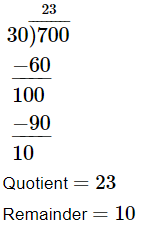Class 6 Maths Chapter 1 Practice Question Answers - Knowing Our Numbers
Q1: Estimate quotient of (725 × 25)
Ans: Here 725 is greater than 25. Round off 725 to 100’s and 25 to 10’s place then find the quotient.
Estimation considering 100’s place for 725 = 700 Estimation considering 10’s place for 25 = 30
Q2: Estimate product of (24 × 85).
Ans: Here 85 is greater than 24. Round off them to 10’s place then find the product.
Estimation of 24 : 10’s place considered = 20.
Estimation of 85 : 10’s place considered = 90.
Estimated product of (24 × 85) to the nearest 10’s place
⇒ 20 × 90 = 1800
Q3: Estimate the difference of (973 − 368) to the nearest hundreds place.
Ans: Here 973 is greater than 368. Round off to hundreds and then find the difference.
Estimation nearest 100’s place for 973 = 1000
Estimation nearest 100’s place for 368 = 400
Estimated Difference of (973 − 368) to the nearest hundreds place.
⇒ 1000 − 400 = 600
Q4: Estimate the sum (304 + 243) to the nearest hundred.
Ans: Here 304 is greater than 243. Round off to hundreds and then find the sum.
Estimation nearest 100’s place:
304 = 400
243 = 200
Estimated Sum of (304 + 243) to the nearest hundred.
⇒ 300 + 200 = 500
Q5: Round off 14850 to nearest 10’s, 100’s, 1000’s place.
Ans: Round off 14850 to nearest 10’s, 100’s, 1000’s place can be done like this,
To nearest 10’s place: 14850 = 14,850
To nearest 100’s place: 14850 = 14,900
To nearest 1000’s place: 14850 = 15,000
Q6: How many 6 digit numbers are there in all?
Ans: Total number of six-digit numbers can be calculated by subtracting smallest six-digit number from the largest six-digit number and then by adding 1 to the obtained difference.
The largest 6 digit number is 999999
The smallest 6 digit number is 100000
∴ Number of all 6 digit numbers = (999999100000) + 1 = 900000
Q7: Which is lesser: 85740264 or 85610784.
Ans: Here both numbers have the same number of digits. Further, the digits at the first two places are the same in both. Then consider moving to the next digit, that is to the digit at the lakhs place. The digit at the lakhs place is lesser in 85610784 than in 85740264. Therefore, 85610784 is less than 85740264.
Q8: What comes after and before 10000000?
Ans: Add one to 10,000,000 then we can find the after count.
1,00,00,001 comes after 1,00,00,000
Subtract one from 10,000,000 then we can find the before count.
99,99,999 comes before 1,00,00,000
Q9: Write the greatest and smallest 4-digit number using 5, 6, 0, 9.
Ans: from the given 4 digits 5, 6, 0, 9
Greatest 4-digit number is 9,650.
Smallest 4-digit number is 5,069.
Q10: Find the difference of place values of two’s, 6’s in 65810624.
Ans: In 65810624, place values of 6 are 60000000 and 600.
First value is 60000000 and second value is 600.
Difference = 60000000 − 600 = 5,99,99,400

















